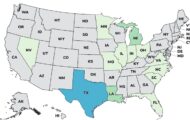A new federal study released today has found that it’s possible that cow manure contaminates wells in a county in Wisconsin and causes Cryptosporidium illnesses. The researchers looked at private wells in Kewaunee County, which is in northeastern Wisconsin on Lake Michigan. The county has a population of about 20,000 people, but there are 100,000 head of cattle in the area. About 12,000 residents get their water from private wells.

The study used data from a countrywide pathogen occurrence study that lasted for a year. The scientist put the numbers into a quantitative microbial risk assessment to predict the cases of acute gastrointestinal illness linked to those wells. The results found that private well contamination could cause more than 300 acute gastrointestinal illnesses per year, and that 230 of those cases were associated with a bovine fecal source. One hundred ninety Cryptosporidium illnesses were predicted per year.
The aquifer in that county is very vulnerable to contamination from surface and subsurface sources because it has karst features, which are a landscape of sinkholes, sinking streams, caves, and springs. In addition, the depth of the soil on the fractured bedrock influences groundwater vulnerability. Water easily gets to the subsurface, especially after rainfall.
Kewaunee county is home to thousands of private septic systems and tens of thousands of cattle. The cattle are concentrated on more than a dozen confined animal feeding operations (CAFOs).
The CAFOs store their manure for long periods of time in manure storage pits or lagoons. Farmers also spread the manure on agricultural fields. The cow manure contaminates wells through spread to the subsurface and groundwater.
Unfortunately, cow fecal matter is not the only contaminant affecting groundwater in the area. Testing of private well samples revealed a number of human and zoonotic gastrointestinal pathogens that included the parasites Cryptosporidium and Giardia duodenalis, and the bacteria Campylobacter jejuni and Salmonella.
Private wells are not monitored by government agencies in Wisconsin. Testing and treatment of these wells is up to each owner. And the health risk associated with these pathogen levels is unknown.
The study’s authors suggest that these predictions could be used for risk mitigation. The impact of cattle manure could be reduced with improved treatment technologies or changes in land application practices. Farm management practices that focus on reducing the impact of Cryptosporidium parvum can help. In addition, more research would be valuable, and multiple interventions may be required to reduce risk.
New rules have been implemented, but the process is slow and will be phased in over the next 10 years. And the Wisconsin Department of Natural Resources is going to put groundwater monitoring wells in that area of the state.





300 illnesses x 10 years? Come on Wisconsin! You can do much better than that.